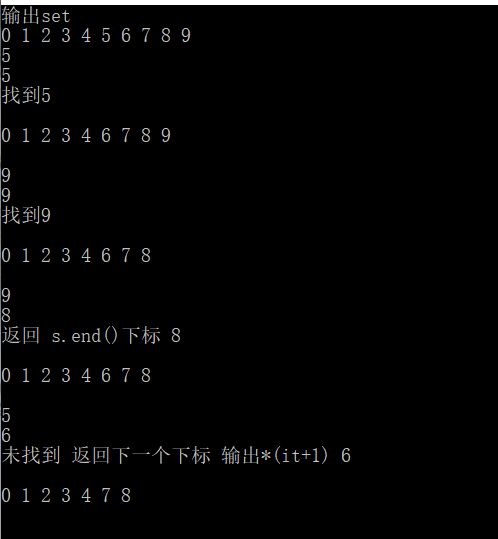lower_bound() 在数组中搜索时
搜不到
返回 .end(),
若需要返回0,用upper_bound()-lower_bound()
若要返回下一个下标 则需要在set / multiset 中使用lower_bound()
下面是测试代码及样例

#include<iostream> #include<cstdio> #include<cstdlib> #include<cmath> #include<cstring> #include<string> #include<algorithm> #include<map> #include<queue> #include<stack> #include<list> #include<set> using namespace std; typedef long long ll; typedef pair<ll,ll> p; typedef long double ld; #define mem(x) memset(x, 0, sizeof(x)) #define me(x) memset(x, -1, sizeof(x)) #define fo(i,n) for(i=0; i<n; i++) #define sc(x) scanf("%lf", &x) #define pr(x) printf("%lld ", x) #define pri(x) printf("%lld ", x) #define lowbit(x) x&-x const ll MOD = 1e18 +7; const ll N = 6e6 +5; set<ll> s; int main() { ll i, j, k, l=1; ll n, m, t; //cin>>n; n=10; for(i=0; i<n; i++) s.insert(i); set<ll>::iterator it; cout<<"输出set"<<endl; for(it=s.begin(); it!=s.end(); it++) k=*it,cout<<k<<" ";cout<<endl; while(cin>>k) { it=s.lower_bound(k); t=*it; //if(t==k) //cout<<"找到" cout<<t<<endl; if(it!=s.end()) { if(t==k) cout<<"找到"<<t<<endl<<endl; else cout<<"未找到 返回下一个下标 输出*(it+1) "<<t<<endl<<endl; s.erase(it); } else { cout<<"返回 s.end()下标 "<<t<<endl<<endl; } for(it=s.begin(); it!=s.end(); it++) k=*it,cout<<k<<" ";cout<<endl<<endl; } return 0; }

